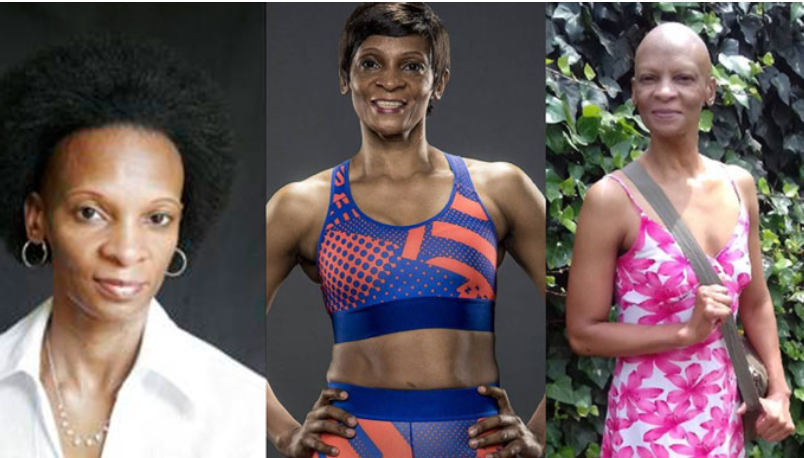Mali Ramara's Story: Turning Hair Loss Into A Source of Strength

Photo: Mali Ramara. Source: Women's Health.
Hair can be considered one’s crowning glory, and this is especially true among women who want to keep their hair healthy. But what would happen if one suffers from a disease that can cause their hair to start falling out? There are many diseases that can cause hair loss, and one of these diseases is an autoimmune disease called lupus.
So, how can lupus affect someone's hair? The widespread inflammation of the disease can affect the face and the scalp. While only a few people experience losing clumps of their hair, the disease has been known to cause people to lose their body hair, eyelashes, and eyebrows.
There are many cases wherein the hair loss is only temporary when lupus is treated. However, there are also instances when people would experience permanent hair loss. According to Lupus UK, this happens mainly due to Discoid Lupus Erythematosus or DLE. When round or discoid lesions develop on the scalp, they can damage hair follicles, which can result in permanent hair loss. Even as hair loss is among the early symptoms of lupus, there are also other diseases that can cause hair to fall out.
Hair loss among women
Hair loss can be a big blow to one’s self-confidence, especially among women. While it was mainly thought to be an issue among males, the American Academy of Dermatology indicated that it also affects women. The organization indicated that hair loss affects women in their 40s, 50s, and 60s. Turns out, female pattern hair loss (FPHL) is a condition that affects millions of women. This progressive condition is the most common reason why women lose hair. A survey conducted by the same organization showed that African-American women are prone to hair loss.
Women may find it challenging to accept their new appearance when they lose their hair due to lupus. It can have a huge impact on their self-image. Fortunately, there are organizations that offer support to women who may find themselves at a loss from what happened to them. These organizations may have a network of trained volunteers who can talk to people suffering from the disease.
Since hair loss is not considered a life-threatening condition, it has been given as much attention by the medical community as other diseases. However, hair loss can have a psychological effect on women, who will feel unattractive with their thinning hair.
Mali Ramara on her struggle with lupus
One person who has accepted the loss of her hair due to lupus is Mali Ramara. Mali is a personal trainer and yoga teacher and is also one of the top ten finalists in the Next Fitness Star competition. Mali used to have a thick, natural afro that made her feel beautiful and liberating as a woman.
All of a sudden, the disaster struck when she was diagnosed with brain lupus in 2013. One of the symptoms of this disease is alopecia, which caused her to lose her hair. Nearly all her hair was gone due to the disease, which left uneven patches of hair on her head that she now shaves two times a week. Mali had a difficult time accepting her situation and did not find it appealing to walk around with a bald head.
Finding Comfort In Wigs
Mali thought that she was more presentable if she wore a wig because it made her appear more feminine. She thought that having a bald head did not make her look, or feel, sexy. Mali tried using an afro wig, but she did not like it. So, she used a wig that was not similar to her former natural hair.
She made the wig a part of her daily routine to make her feel accepted. Mali thought it was necessary to present a certain look to other people. Even though she felt accepted whenever she wore a wig, she was still self-conscious. Her clients never thought she was bald whenever she wore it. Mali said she had no sense of style and she noted that the wig she wore during personal training looked hideous. At first, she started wearing cheaper wigs because the ones that were good quality were costly, however, Mali later replaced them with better-looking wigs. her clients still had no idea that she had no hair, no matter how much her appearance changed.
Revealing Her Baldness To The World
In 2017, Mali made it to the top ten of the Next Fitness Star competition of Women’s Health. It was during this competition when she finally revealed her baldness to the world. Mali posted a video on Facebook showing her bald head. And, prior to the event, no one was aware that she was bald.
The video drew positive feedback for Mali, from both men and women. People said she looked great, and it made her look younger. In fact, some women who were about to grow their hair longer decided to go bald after seeing the video.
But, Mali was not yet ready to let go of her wig. When she went to Cape Town as part of the Next Fitness Star competition, one of the contestants told her to use her strength, which was her bald head. Mali found this notion intriguing and considered it.
Accepting Her Baldness
August 2017 can be considered as a turning point for Mali. She was facilitating a yoga retreat with the theme of letting go of things that were holding a person back. Mali wore her wig on Friday evening. But then, the next day, she decided to conduct the Mind Body Nutrition and her yoga meditation session without wearing the wig. She showed her bald head while facilitating the session as well as shooting a yoga video.
Mali said she did not want her bald head to define her or hold her back. She felt by facilitating the session without her wig allowed her to give the best version of herself. Everyone who participated responded positively to what Mali did.
Using Baldness As A Source Of Strength
When Mali went back to work on Monday, she started training without wearing a wig. One of her clients who had no idea she was bald said she looked better without it, and a male client also told her that her new look made her appear cool and liberated. After she heard the compliment, Mali told herself that everything will be okay. She decided that her new look will be a part of her personal and company brand going forward.















